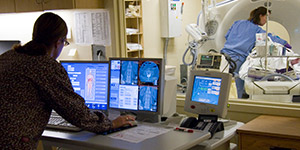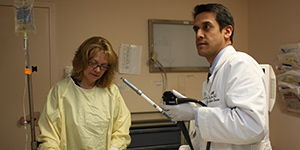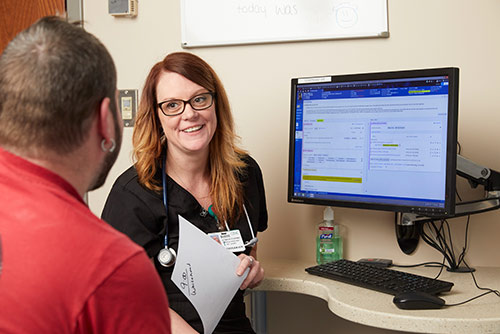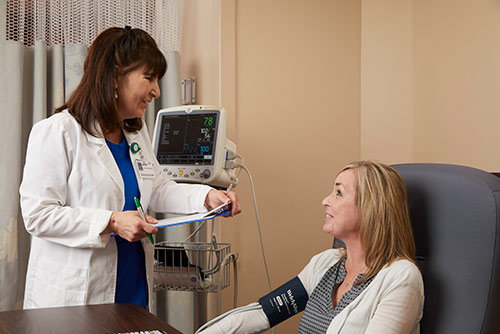Inflammatory Bowel Disease Center
Dedicated to using a multidisciplinary team approach in diagnosing and caring for patients with Inflammatory Bowel Disease
When you have Inflammatory Bowel Disease (IBD), your life might feel like it revolves around doctors’ offices, pharmacies, and restrooms. Your symptoms, which can include daily diarrhea, bloody stool, and abdominal pain are challenging or impossible to manage without help. If you suffer from IBD and are missing out on time with family members, professional opportunities, and hobbies, it’s time to take your life back. GBMC’s Inflammatory Bowel Disease Center features a comprehensive and personal approach to care, close to home. Led by Diana Whitehead, MD, it encompasses all the specialties a patient might need under one convenient roof.
Due to the many different facets of IBD, caring for people who suffer from it requires teamwork across medical disciplines. Our IBD Center brings together a team that includes gastroenterologists, nurse practitioners, colorectal surgeons, radiologists, pathologists, nutritionists, psychiatrists/psychologists, behavioral health consultants, as well as dedicated nurses, medical assistants, and wound care staff members to ensure each patient receives the best in collaborative care.
GBMC’s Inflammatory Bowel Disease Center treats Crohn’s Disease and Ulcerative Colitis, which are collectively known as Inflammatory Bowel Disease (IBD). These are chronic, structural diseases (meaning they are associated with physical damage to the bowel) that affect more than 1.6 million people in the United States.

Diana Whitehead, MD
Director, Inflammatory Bowel Disease Center
Along with practicing general Gastroenterology and Hepatology, Dr. Whitehead has a special interest in inflammatory disease and caring for patients with Ulcerative Colitis and Crohn's Disease. She completed her fellowship in Gastroenterology with a focus in Inflammatory Bowel Disease at Dartmouth-Hitchcock Medical Center in New Hampshire, where she also served as an instructor of medicine at Geisel School of Medicine at Dartmouth. She completed her residency in Internal Medicine at Brown University, Rhode Island Hospital and earned her medical degree from SUNY Upstate Medical University. Dr. Whitehead is board certified in Internal Medicine and Gastroenterology.
Our Services
GBMC’s Inflammatory Bowel Disease Center offers a variety of treatment options for Crohn’s Disease and Ulcerative Colitis, including:
- Aminosalicylates (5-ASA)
- Sulfasalazine
- Mesalamine
- Olsalazine
- Balsalazide
- Antibiotics
- Ciprofloxacin
- Metronidazole
- Amoxicillin/clavulanate
- Biologic therapies
- Adalimumab
- Infliximab
- Certolizumab pegol
- Golimumab
- Infliximab-dyyb (Inflectra)
- Vedolizumab
- Ustekinumab
- Corticosteroids
- Prednisone
- Budesonide
- Immunomodulators
- Azathioprine
- 6-Mercaptopurine
- Methotrexate
- Small Molecules
- Tofacitinib
- Surgery
- Ileostomy
- Colostomy
Our program integrates with the following specialty services at GBMC
- Gastroenterology
- Colorectal Surgery
- Geckle Diabetes & Nutrition Center at GBMC
- Behavior Health Specialist: GBMC/Sheppard Pratt
- Psychiatry: GBMC/Sheppard Pratt
- Infusion center: In office
- Ophthalmology
- Ostomy Center at GBMC
- Dermatology
- Rheumatology
Frequently Asked Questions
Crohn's disease is a chronic inflammation of the bowel. While Crohn’s disease primarily affects the end of the small bowel known as the terminal ileum, it can occur in any part of the large or small intestine, stomach, or esophagus.
Crohn's disease affects the entire thickness of the walls of the bowel, explaining why patients with Crohn's disease can develop fistulas (abnormal openings between two organs, or between an organ and the skin) and abscesses. Typically, these complications can be life-threatening and may require surgery.
Crohn's disease can increase the risk of colorectal cancer, so it is important to follow your physician’s recommendations for regular surveillance colonoscopies.
Ulcerative Colitis is a chronic inflammation that occurs only in the large intestine. It usually does not affect the stomach, esophagus, or small bowel, but may cause inflammation in the terminal ileum (end of small bowel) in cases where the entire colon is inflamed.
Ulcerative Colitis affects only the inner layer of the colon (mucosa), and does so in a continuous pattern. Severe inflammation and ulceration over time can cause the colon walls to become thinner, which may then lead to perforation, or tearing, of the colon. This complication can be serious and life-threatening.
Ulcerative Colitis can also increase the likelihood of colon cancer, so it is important to follow your physician’s recommendations for regular surveillance colonoscopies.
The exact cause of IBD (Crohn’s Disease and Ulcerative Colitis) is unknown. It is believed that an environmental trigger, such as infection from a virus or bacteria, occurs in a genetically susceptible person, leading to abnormal activation of the immune system (the body’s defense against infections). This causes inflammation of the intestines, which results in symptoms including diarrhea, abdominal pain, and rectal bleeding.
While Crohn’s Disease and Ulcerative Colitis tend to run in families, researchers have been unable to establish a clear pattern of inheritance. However, studies have shown that 15-20% of patients with Inflammatory Bowel Disease have a close relative who is also affected by it.
Crohn’s Disease and Ulcerative Colitis are more common in people of eastern European backgrounds, including Jews of European decent. Recent studies show an increased incidence of the disease in the African Americans and Hispanic populations as well.
- Diarrhea
- Abdominal pain
- Rectal bleeding
- Constipation
- Sensation of incomplete evacuation
- Urgent need to move bowels
- Fatigue
- Weight loss
- Night sweats
- Loss of appetite
- Routine blood test
- Upper endoscopy
- Colonoscopy
- Flexible sigmoidoscopy
- Small bowel enteroscopy
- Capsule endoscopy
- MR Enterography
- CT Enterography
- Upper GI series
- Small bowel follow-through
- Barium enema
- MRI pelvis
With similar names and symptoms, it’s easy to see why IBD is often confused with IBS.
IBD is a disease associated with structural damage to the bowel, such as chronic inflammation, an ulcer, or other abnormality that can be seen with X-ray, during an endoscopy, or in a blood test. Crohn’s Disease and Ulcerative Colitis are the two types of IBD.
GBMC’s IBD Program cares for patients with both types of IBD.
IBS is a disease that affects bowel function, but not its structure. X-rays, endoscopies and blood tests will not reveal any physical damage. Symptoms include persistent and recurrent abdominal pain associated with diarrhea, constipation, or both. This pain is often relieved after a bowel movement. Patients may experience bloating, gas, and passage of mucus in their stool. IBS is thought to be related to:
- Increased or irregular muscle movement
- Increased sensitivity to intestinal sensations
- Dysregulation of brain-gut function
- A change in the bacteria within the GI tract
Patients with IBS are cared for by Diana Whitehead as well as her colleagues within GBMC’s Gastroenterology Practice.
Diverticula are small pouches that protrude from the wall of the colon. The development of these pouches is a condition known as diverticulosis. These pouches are extremely common – they tend to occur as people age – and are relatively harmless.
Diverticulitis occurs when stool or bacteria gets trapped in a pouch, which causes infection. Symptoms may include fever, severe abdominal pain and blood in the stool. Untreated diverticulitis can lead to complications like abscesses, perforation of the intestine, and development of fistulae (narrow, abnormal openings between two organs, or between an organ and the skin). Treatment with antibiotics is often needed to control the infection and in some cases, surgery may be required.
Diverticulosis and diverticulitis are not related to IBD. However, someone who suffers from IBD can also have diverticulosis or diverticulitis.
Patients with diverticulosis or diverticulitis are cared for by Diana Whitehead as well as her colleagues within GBMC’s Gastroenterology Practice.
Related Services



Gastroenterology Practice at GBMC
6565 N. Charles St. Pavilion East, Suite 512 - Towson, MD 21204











